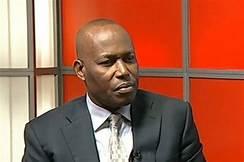Inside Stuff With MARTINS OLOJA
Last week, I was summoned to Abuja, Nigeria’s seat of power, specifically to explain whether my team in Rutam House and my colleagues in the news media have any capacity to monitor governance and hold the government to account in this age of the giants – that have disrupted the business dynamics journalism.
Dayo Aiyetan’s International Centre for Investigative Reporting (ICIR) collaborated with the McArthur Foundation to implicate me even as they knew the answer to their question was already blowing in the wind. The theme of the colloquium and media awards to three investigative journalists is: ‘The role of the media in promoting public accountability.

The media capacity question as the dominant element in the keynote in Abuja last week, had for quite some time kept me thinking about managing media, which is not so significant in the curriculum of journalism in this part of the world.
I had in 2018 raised the question at a seminar I addressed at the Bayero University attended by most of the Heads of Departments of Journalism and Mass Communication in Nigerian Universities and Polytechnics (156) of them). I had then suggested a disruption of the mass communication and journalism curriculum to include management and business education modules. Reason? Media boards of directors have always moved journalists from newsrooms to boardrooms without concomitant training in management of even finances. This will be a discussion point on the state of the media in our milieu, any time soon.
In any case, as I was saying, I suspected that the ICIR strategists who seemed to have been harbouring some hidden agenda to implicate me and my colleagues in this part of the world where the economy dominated by public sector engagement can hardly sustain press freedom, wanted me to address what I call, “the political economy of press freedom” in Africa’s most populous country. Let read some excerpts from my presentation:
“…The role of the media is clearly spelt out in Section 22 of the constitution – to monitor governance and hold public officers to account. Only good and independent journalism can deliver this tough job. This is where people will feel that the news media actually promote the public good. In other words, development agencies should not lose sight of this fact: that only a truly independent news media can monitor governance, lest they become lapdogs.
That is why Sina Odugbemi, former Programme Head, Communication for Governance and Accountability Programme (CommGAP) at the World Bank (Institute) once observed in a (World Bank) publication titled, Public Sentinel: News Media and Governance Reform that, ‘A focus on strengthening institutions like the news media is not yet seen as a core business in many development agencies.
That is therefore why opportunities to strengthen the news media will always depend on the situation in each country and will always depend on the interplay of forces within each country. Odugbemi in the same vein believes that ‘the political-economic realities will always determine what can be achieved. What that means is that those who want to improve media systems in their own countries must learn to build effective coalitions. That is where work is really needed. In that treatise, Odugbemi says nonetheless, it is possible to bring together what we know right now about how news media can contribute to good governance outcomes. Second, it is possible to draw the necessary policy implications. This is where the political economy of a free press is relevant.
Gatekeeping and fostering of civic competence
Gatekeeping we simply call the art of editing is a vital process, which determines the silencing or expression of various voices. Those who control the conduits for expression have the power to filter what kind of information, or whose gets into the public realm and hence gets attention or shapes the public discourse. The media have a significant influence on the public sphere, through the exercise of this control. Depending on how they exercise this control, the media can help shape civic competence among citizens.
What is civic competence?
Civic competence is the citizens’ ability to understand, engage with, and make appropriate demands on the state while meeting their responsibilities and obligations as citizens, for example, through voting and public service.
The Ford Foundation raised the following questions in a summer 2003 Forum on media diversity and public interest:
Regarding the responsibility of media
The current media system in the United States and other Western nations is manifested by giant cross-platform conglomerates dominating the printed, spoken and viewed news. Does this system promote the diversity of perspectives and viewpoints (the ‘marketplace of ideas’) essential for citizens to function in an informed way within their participatory government and social environment?
Regarding the responsibility of journalism
Modern media corporations seem far more interested in profits than they are in news dissemination. Because of this, or in spite of this, do they provide sufficient content services to adequately address the local news and information needs of citizens and communities?
These are two momentous questions. They have never had to be asked before in quite this way. We need to deal with these questions and their many ancillary questions, debating if the present conglomerates are meeting the responsibilities of both the media and journalism and if not, whether anything can be done about it.
Some historical perspective of the media in other lands
Early journalist Lincoln Steffens warned about the corporatisation of newspapers as early as 1897 declaring, ‘The magnitude of the financial operations of the newspaper is turning journalism upside down. Big business was doing two things in general to journalism: it was completing the erection of the industrial institution upon what was once a personal organ, and it was buttressing and steadying the structure with financial conservatism’.
Former Des Moines Register editor and Washington Post Ombudsman Geneva Overholser sees a weakening of journalism under most chain ownership. ‘In an era that cries out for entrepreneurialism and a belief in the future, she wrote, ‘newspapering is risk-averse and dispirited, cowed by the over-emphasis on the short-term profits, and steadily bleeding the commitment to public service that animates us’.
In other words, the market-driven journalism genre has long been with us. That is why modern researchers on media management such as Dennis Herrick, author of. ‘Media management In the age of Giants…’ are now focusing on ‘the business dynamics of journalism’, which is threatening press freedom in our country that unfortunately cannot boast of a robust private sector, which should be the oxygen of a free press.
Undoubtedly, the relevant question is: in this age when citizen journalism practice, which tends to empower everyone as a journalist through investigative journalism, can public office holders and stockholders be monitored and held to account? Breaking news items, most of which are press statements and official pronouncements can be newsworthy. They are most times public relations. Why do I say that? The classic definition of news is: News is something, somebody somewhere is trying to hide, the rest is advertising. This is what viewers, readers, and listeners want from the news media – revelations. Pubic officials even in global context, would always want to hide something from the public. And so a journalist’s capacity to dig out something the public officials want to hide is the way to hold them to be accountable.
That is why experts tend to agree that investigative journalism is capable of pricking at public capacity for outrage. Some even call it ‘journalism of outrage’. That form of journalism is now being nurtured by data (data journalism). It has measurable elements and has persisted and endured everywhere as a way of ‘seeking reform within a system’.
To understand the role of the media, let’s share some thoughts on newsgathering, which is the focal point of journalism. “News is something somebody doesn’t want to be printed; all else is advertising.”― William Randolph Hearst. Oscar Wilde said, “Speaking the truth that somebody wants you not to publish is journalism. Everything else is marketing.” “Journalism is printing what someone else does not want printed: everything else is public relations.” Yet we found another similar quote from Horacio Verbitsky (in Spanish): “Journalism is to spread what someone does not want you to know; the rest is propaganda.” A version of this quote first appeared on 30 November 1918, on page 18, column 4 of The Fourth Estate: A Newspaper for the Makers of Newspapers, Ernest F, Birmingham, Fourth Estate Publishing Company, New York. The quote is as follows:“Whatever a patron desires to get published is advertising; whatever he wants to keep out of the paper is news,” is the sentiment expressed in a little framed placard on the desk of L. E. Edwardson, day city editor of the Chicago Herald and Examiner. You can now see why Nigeria’s Information and Culture Minister is just doing what he is paid to do: ‘public relations and advertising for his employers. But the point is: no power on earth can stop the role of the press and mass media in any political system in monitoring governance and holding public officers to account.
Ordinarily good journalism should be one of democracy’s safety valves. Without it, journalism can become sterile and barren. Without it, these days, a newspaper can become uncaring and bloodless. Without it, it becomes easier for the government and our society to develop hardening of arteries and the heart.
But the question today is: will investigative journalism survive what seems to be an inexorable trend toward concentrated corporate ownership of news-media organs?
As it is often noted, investigative journalists the world over are no strangers to controversy. By exposing abuses of power, media muckrakers have had to endure frequent legal challenges, ethical critiques and political attacks. Yet in most parts of the world, investigative reporting has survived and even prospered in this often-hostile environment.
In the United States, for instance, the notion that investigative reporting can be a powerful catalyst for change has gained widespread acceptance in post-Watergate America. For more than two decades, the public has been inundated with news stories by crusading journalists who expose alleged misconduct and right reputed wrongs. The reformist image of investigative reporters has been further reinforced and embellished by movies and books. This is how that accountability works: vigilant journalists bring wrongdoing to public attention. And then an informed citizenry responds by demanding reforms from their elected representative. Policy makers in turn change by taking corrective action.
‘Still on the power of investigative journalism’
Where is the capacity to hold the powerful to account? If News in its classic form is what somebody, somewhere is trying to hide, and the rest is advertising, let’s ask more questions: Do today’s media organisations in Nigeria have capacity or enough capitalisation to hire investigative journalists that can hold public officers to account without caring a hoot about advertising support from organisations or agencies run by them?
Why do the state actors in Nigeria seek to criminalise journalism, which they always demonise as threatening national security and the media managers don’t often write robust editorials and investigations that can expose them?
***Let’s continue in the next issue on the political economy of press freedom vs accountability…and why the media here can’t monitor governance robustly.
Stay ahead with the latest updates!
Join The Podium Media on WhatsApp for real-time news alerts, breaking stories, and exclusive content delivered straight to your phone. Don’t miss a headline — subscribe now!
Chat with Us on WhatsApp







